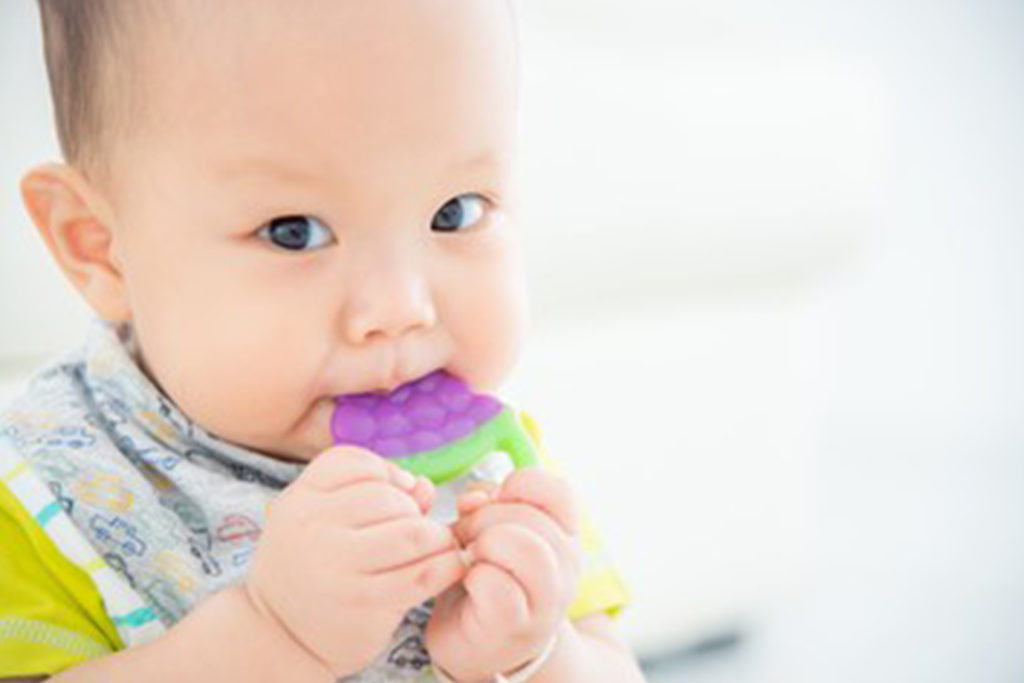Why is it Important for Babies to Mouth?

Have you ever noticed a baby with their hands in their mouth? Babies are learning to explore through the hand-to-mouth connection. Mouthing is an important development for babies to learn new sensations in the world, as well as calming oneself. There are different mouthing learning periods, lasting to 2 years and beyond. Let’s explore why it is important for babies to mouth, the learning periods, as well as how to support a baby in each stage.
Generalized Mouthing Period (Birth to 4-5 Months of Age)
At birth, babies show a rooting reflex where your baby’s mouth searches for the touch near the mouth with small side-to-side head movements. As a baby grows, decreased rooting reflex emerges when items touch a baby’s mouth. This is the generalized mouthing period. Sensations of soft and firm are being explored. Around 2 months of age, a baby will begin to bring hands to mouth while laying on back or belly. Then, around 3 months of age, a baby will begin to grasp a toy and bring to mouth, suckling. Lastly, between 4-6 months, the biting reflex increases, and the gag reflex is coming under control.
Many changes to a baby’s facial structure happen in the first mouthing period, from jaw growth to the space between a baby’s nasal area and mouth increasing. It is important for a parent to support the baby’s sucking and suckling of hands and safe, appropriate toys to prepare the transition to discriminative mouth period.
Discriminative Mouthing Period (5-6 Months to 9 Months of Age)
Discriminative mouthing is very important for a baby’s development. In this period, a baby will move items within the mouth to explore, learning of tastes, temperatures, sizes, and textures. Biting, chewing, and tongue movement is also explored using safe toys, fingers, and foods. This promotes development of the jaw and teeth to emerge, as well as providing more developmentally appropriate methods for the baby to calm oneself. It is recommended to wean off the pacifier after 6 months of age as extended use of a pacifier can be detrimental to overall facial development. Subjectively, babies who skip or have little time in the discriminative mouthing period have greater difficulty in developing feeding and speech skills.
The Beginning of True Mouth Play (9 Months to 12 Months of Age)
More mature and precise biting, chewing, and manipulation of toys within the mouth occur. Desired diagonal rotary chewing and jaw movements is emerging. Babies will have less mouthing and more intention in using the mouth appropriately with toys. Therefore, to help, a parent can support these skills with supervised horn blowing and bubbles.
True Mouth Play (12 Months to 24+ Months of Age)
Babes achieve many skills in this stage. Respiration is maturing, and babies use lips and cheeks together to shape for straw drinking and horn activities. The tongue thrust swallow is decreasing, and the jaw and tongue learn to move independently of one another. By now, chewing, open cup drinking, or straw drinking have replaced sucking for calming.
However, it is important to remember these are not rigid timelines. We recommend parents support the child no matter what stage the child is within. The following are item suggestions for each period:
- Generalized Mouth – Baby’s own hand, parent’s finger, rounded teethers, easy to grab teething toy balls
- Discriminative Mouthing – Elongated teething toys made to isolate the molar area (promote chewing), foods cut as “match sticks” to isolate molar area and promote chewing while providing consistent supervision (if foods have been introduced and are going well)
- Beginning and True Mouth Play – Baby horns, bubbles, and pop tubes all with parent supervision
For more resources, check out MOSAIC’s Patient Education page for a teething toy handout and recommended cups for kids 6 months and up.
Resources
- Bahr, D. (2001). Nobody Ever Told Me That! (Or My Mother) (pp. 91-108). Arlington, TX: Sensory World.
